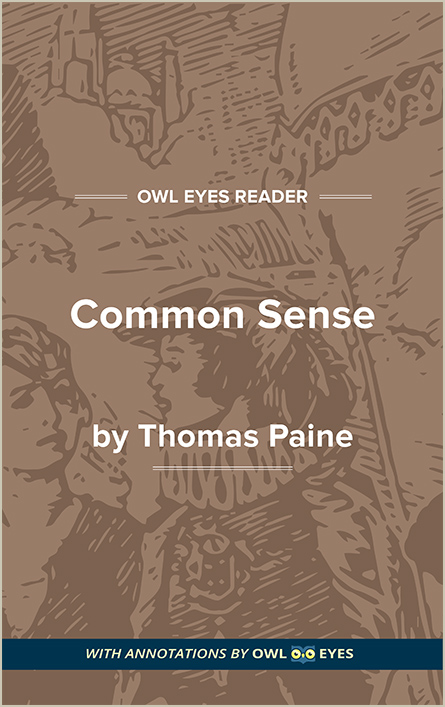Study Guide
Analysis Pages
Summary
Common Sense, a sixty-seven-page pamphlet advocating complete separation of Great Britain’s North American colonies from the parent country, is one of the most influential pieces of political writing ever published. It is also an important landmark in the history of literary development, representing the first major piece of political writing, in any language, to effectively reach the working classes. The pamphlet appeared in Philadelphia on January 10, 1776, at a critical juncture in the genesis of the American Revolution. A state of armed rebellion had existed in Massachusetts since April, 1775. The Continental Congress, first convened in 1774 and reconvened in 1775, was meeting in Philadelphia. Many of its members, selected by colonial assemblies, were cautious in their approach to independence and believed a compromise was possible. Thomas Paine wrote on behalf of those who felt such caution did not reflect the will or best interests of most North Americans. Common Sense aimed to bring pressure to bear on indecisive politicians by galvanizing popular opinion in favor of complete separation backed by force of arms.
The pamphlet appeared at a particularly opportune moment. Its publication coincided with the arrival of George III’s address to Parliament declaring the colonies to be in a state of rebellion and pledging to use military force to prevent separation. The resentment against the British monarchy that this communication fanned resonated with the strong antiking, antiaristocratic message of Common Sense.
The work comprises four chapters, with an introduction and appendix added in the second (February, 1776) edition. The first two chapters discuss the origins of government and the structure and function of the British monarchy, respectively. Chapter 3 focuses on the political situation in 1775-1776 and contains specific recommendations for recruiting soldiers, financing a war, and structuring a new government. Chapter 4 recapitulates the arguments of chapter 3, urging unity and continued armed resistance at a level sufficient to achieve victory.
In the first chapter, “On the Origin and Design of Government in General, with Concise Remarks on the English Constitution,” Paine views government as a necessary evil, arising when people begin associating in larger social groups and require rules and authority to restrain their baser instincts. He envisions the original form of human government as republican, without hereditary distinctions, and views the British government of his day as the base remnant of two ancient tyrannies—monarchy and aristocracy—with some new republican materials grafted on in the form of the House of Commons. Any disposition to retain this fundamentally corrupt form of government, he warns, will hinder the formation of something better. The chapter was an argument against those who wanted more colonial autonomy but wished to retain ties to the Crown.
Chapter 2, “Of Monarchy and Hereditary Succession,” begins with a commentary on the biblical stories of Gideon’s refusal of the crown of Israel (Judges 8) and Samuel’s anointing of Saul (I Samuel 8-10), emphasizing that Israel became a monarchy in imitation of its heathen neighbors and that the prophet Samuel warned the Israelites against crowning a king. It argues that, as bad as it is to vest absolute power in one man under any circumstances, hereditary kingship is far worse because the representatives of the people no longer have any say in the succession.
Paine minces no words in his abuse of George III, calling him insolent, ignorant, and unfit. Britain’s king, according to Paine, has no real function but devours the public wealth and controls the Commons by dispensing places. Paine points out that some would argue that a monarchy confers stability. In response, he asks: If this is the case, why has England been so frequently plagued by civil wars, while Switzerland and Holland, which have no king, have been peaceful by comparison?...
(The entire page is 1,416 words.)
Owl Eyes subscribers get unlimited access to our expert annotations, analyses, and study guides on your favorite texts. Master the classics for less than $5/month!

